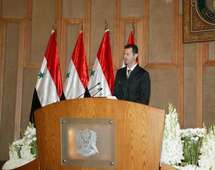Syria's Assad offers dialogue, refuses 'chaos'
AFP
DAMASCUS- President Bashar al-Assad said on Monday that dialogue could lead to a new constitution and even the end of his Baath party's monopoly on power but refused to reform Syria under "chaos."
After widespread condemnation of a brutal crackdown on anti-regime protests, the country was at a "turning point," he said in a televised speech at Damascus University, vowing Syria would emerge stronger from the "plotting" against it.

"We can say that national dialogue is the slogan of the next stage," Assad said. "The national dialogue could lead to amendments of the constitution or to a new constitution."
He insisted that a reform process in Syria was "a total commitment in the interest of the nation."
Offering his condolences to the families of "martyrs" from the unrest rocking the country since mid-March, Assad said there could be "no development without stability, no reform in the face of sabotage and chaos."
"We make a distinction between those (with legitimate grievances) and the saboteurs who represent a small group which has tried to exploit the goodwill of the Syrian people for its own ends," said Assad.
The Syrian leader's third speech to the nation since the protests broke out, punctuated by applause from the invited audience, was buoyed by a Russian pledge to block Western moves against him at the United Nations.
In an initial reaction, an opposition figure said the speech failed to specify concrete steps such the army's withdrawal from population centres.
"There were a lot of ideas in the speech. But the withdrawal of the army and security forces was not raised, which is not very reassuring and puts the emphasis on a military solution," said Hassan Abdel-Azim, a lawyer.
The European Union, meanwhile, was preparing to expand sanctions against Assad's regime, according to a draft resolution to be adopted by foreign ministers on Monday.
The EU has been looking at adding firms and a dozen people to a blacklist of 23 people targeted by an asset freeze and travel ban which already includes Assad and key allies.
British Foreign Secretary William Hague said the international community was looking for Assad to "respond to legitimate grievances" of his people, insisting "Assad should reform or step aside."
The Syrian leader has made two previous interventions during the unrest.
On March 30 -- two weeks after the protests against his 11-year reign started -- he addressed parliament and called the demonstrations a "conspiracy" fomented by Syria's enemies.
On April 16, he announced in a televised address that the emergency law in force for nearly 50 years would be abolished, expressed his sadness at the deaths of protesters and called for a national dialogue.
The opposition dismissed that offer as too little too late.
To step up the pressure on Assad to deliver real change, Western governments have been circulating a draft resolution at the Security Council that would condemn his crackdown on dissent.
But President Dmitry Medvedev said on Monday that Russia was ready to use its veto to block any such move.
Speaking in an interview with the Financial Times, Medvedev said he feared the text would be used as cover for Libya-style military action.
"What I am not ready to support is a resolution (similar to the one) on Libya because it is my deep conviction that a good resolution has been turned into a piece of paper that is being used to provide cover for a meaningless military operation," he said.
"There will not be such a resolution. Russia will use its Security Council permanent member rights," he said, referring to Moscow's right of veto.
British Prime Minister David Cameron had said that if any Security Council permanent member threatened to veto the Western draft then "that should be on their conscience."
But Medvedev insisted he did not want to have on his conscience the fact that he had failed to halt a potential drift to military intervention.
Syrian opposition activists, who announced the creation of a "National Council" on Sunday to spearhead their battle to oust Assad's regime, expressed frustration at the failure of the international community to act more vigorously.
"In Libya, after the death of 200 people, Kadhafi no longer had legitimacy," their spokesman Jamil Saib said.
"Here in Syria, while all human rights groups say that there are 1,500 killed and thousands of injured or people arrested, the international community and the Arab world are silent."
According to the London-based Syrian Observatory for Human Rights, the violence has so far claimed the lives of 1,310 civilians and 341 security force members.
-------------------------------------------------------------------------------